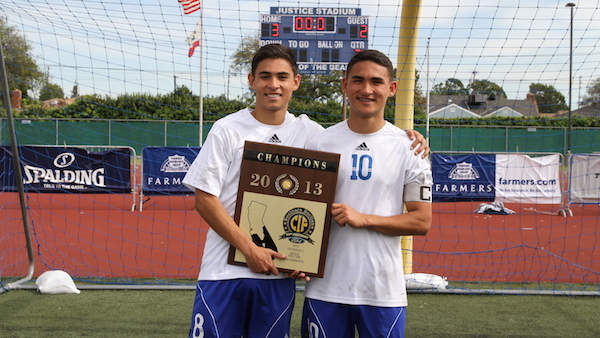Keys to making your high school soccer team

If you’re one of the 100’s of thousands of high schoolers planning to try out for your high school soccer team every year, you need to do a couple of things to get ready. Even if you don’t make the team, don’t let it define you as a soccer player because lots great and successful athletes didn’t make a high school sports teams:
Keys to making your high school soccer team
1. Be in peak shape before you show up, including a good diet. High school coaches aren’t travel coaches; they don’t have to deal with politics of convincing the best players to choose them. They get to choose you – because you have no place else to go if you want to play high school ball.
But it isn’t an easy choice. You are competing with 40, 50, even 75 others for a spot on the Varsity team, and that’s a lot of numbers for high school coaches to fairly consider. They have to find a way to quickly weed out the weak links or the uncommitted players, and they often do that by running you into the ground early on in tryouts. Why? Because how good a shape you’re in is an indicator of your commitment to your sport. It doesn’t matter how good you are, how many juggles you can do, how many goals you scored for your club team. If you aren’t in shape on the first day of tryouts, you’re not committed, and that’s a big negative right from the start.
But you can control that 100%. Don’t blame anyone but yourself if you don’t have the energy to make that late run back on defense, or to chase down that last loose ball. It’s the last 10 minutes of games or of practices that impress coaches the most, not the first 10 minutes.
2. Speaking of commitment, you have to fully buy in. I don’t know many club coaches that don’t wish their players never played high school. Whether they say it or not – though most do say it. A lot of club coaches either think high school coaches are idiots, or they at least selfishly don’t want their players to risk injury or fatigue on their high school teams when they have club league championships to win and college showcase tournaments to qualify for.
But if you decide to play high school, that means you have already decided your club coach is wrong at some level if they don’t want you to play, so don’t show up at high school tryouts thinking that coach is wrong too. If you REALLY trusted your club coach knew everything there is to know, you wouldn’t go against their wishes and play high school anyway would you? So, accept the fact that in your heart, you know your club coach doesn’t know everything, and open your mind to what you can learn from the high school team. There is always something to learn. Every great coach and player, even World Cup winners, will tell you they never stop learning.
3. Remember it’s a tryout. It’s not practice, it’s not team building. It’s a tryout. You do need to stand out. You do need to be a little selfish, but that doesn’t mean you purposely hog the ball or try to bring others down. The BEST players make players around them better. They give better service, they move more off the ball to give options, and they communicate in a positive way. But you can do all of that, and still show off your own abilities. You can still ask for the ball a lot, keep it a little longer when you’re near goal, and even give it up a little faster near your own goal to avoid the risk of losing it and getting scored on. Between playing sessions, always be first when the coach calls the group in, standing in front, and keeping eye contact at all times when the coach is speaking. Be early to every session and start knocking a ball around on your own or with a friend. Stay after and work on free kicks. Help carry the gear or water bottles. Help other players understand the next exercise if they don’t get it. Don’t ask “when are we scrimmaging” or “what time is it” or “did you see that coach?” Those are all things you might ask once you make the team and get to know your coach better. But not at a tryout! In short, be 100% about the soccer; but don’t be fake, show any sign of disinterest, or do anything to try and bring others down because you think it makes you look better.
4. Never give up. If you’re last in a sprint because you stumbled, keep running your hardest to the end. If you miss a shot, but the ball is still in-bounds, follow it and keep trying to score until you hear a whistle, or “stop”. And above all, never give up on your dreams. Don’t let one coach’s opinion effect the rest of your life or how you feel about the sport. Even if you don’t make the team, are offered a spot on JV, or make the team but feel like the coach isn’t your biggest fan, don’t cave. Don’t let the stress of the situation get to you, and never give anyone trying to bring you down the satisfaction of succeeding.
Take any coaching critiques as a learning opportunity, not an assault on your social status. Take comments from teammates as them just wanting to win, not a personal insult. Or, if they are insulting you, laugh to yourself knowing that only means they see you as a threat – if not to their position on the team, then to something else. Most people don’t pay attention to others they don’t want to be friends with, don’t want something from, or don’t want to use to make themselves look better. Never let another player – or coach – affect your performance in a negative way. They have nothing to do with it.











